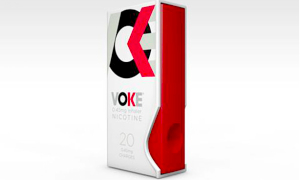
UK parliament’s tech committee prepares to investigate e-cig science
15th March 2017 - News analysis |
A UK parliamentary select committee is to launch an investigation into the science behind e-cigarettes.

A UK parliamentary select committee is to launch an investigation into the science behind e-cigarettes.

The “social image” of vaping may have overtaken smoking cessation as the most popular reason for using e-cigarettes – which many find more satisfying than smoking. Those are the striking conclusions of two recent studies of the perception and usage of e-cigs.

U.S. president Donald Trump on Friday announced his intention to nominate Scott Gottlieb as the next commissioner of the Food and Drug Administration (FDA), ending a months-long process watched closely by the e-cigarette industry.

A study claiming to have added to evidence that vaping can be “a one-way bridge to smoking” by young people has been subjected to critical analysis – and found to be seriously wanting.

French doctors, officially barred from giving advice on vaping, have been offered a set of recommendations on how to answer patients’ questions about e-cigarettes – and which groups of patients they can be most useful for.

Two new real-world studies of the (relatively) long-term health effects of vaping come to very different conclusions: one very positive about reduced cancer danger, the other sounding a warning about possible cardiovascular implications.

How effective – and in particular how cost-effective – can e-cigarettes be at a national level in the battle against smoking? These are questions governments and researchers are starting to take seriously.

Recent reports of high failure rates among e-cigarette chargers tested by authorities in Wales highlight the need for vigilance by manufacturers to ensure their products meet safety standards.

A survey undertaken in the U.S. state of Kentucky will do nothing to cheer the e-cigarette industry, or public health professionals concerned at the cumulative effect of a long series of negative stories.

Most 11-18 year-olds who use e-cigarettes don’t subscribe to any particular brand, a new analysis of U.S. survey data reveals – but those who do know what brand they vape tend to choose the most heavily advertised.

British American Tobacco has ceased its involvement in the commercialisation of the medically licensed Voke nicotine inhaler.

The U.S. Food and Drug Administration (FDA) is to hold a workshop on battery safety to learn more about the risks of malfunctions in e-cig power sources and how to prevent them.

The smallest country in the European Union has taken a lead in attempting to clear up a common ambiguity in e-cigarette regulation by making it specific that a law against smoking in cars when a child is present applies equally to vaping.

May 2016 brought the two biggest regulatory developments in the short history of the e-cigarette so far. But the U.S. deeming regulations and European TPD were far from the only stories brought to you by ECigIntelligence in another year of rapid change…

A manufacturer has developed a new synthetic nicotine test that it says shows concerns about a number of rival products.

A new small-scale study has cast some doubt on the difficulty of differentiating smoking and vaping as well as whether public vaping renormalises tobacco use.

While few European medical bodies have provided guidance on e-cigarettes for general practitioners, the British Heart Foundation is hoping to fill that gap in the UK through a new study.

A new study claims there is no evidence that nicotine “causes or promotes” cancer and calls for health authorities to try and move smokers towards less harmful nicotine delivery products as quickly as possible.

The legal classification of e-cigarettes in Indonesia is far from clear – whether they come under regulations relating to tobacco, pharmaceutical or consumer products.
What does seem clear is that e-cigs continue to be legal for now, despite some reports last year to the contrary. It is possible they may become illegal in future. Our in-depth regulatory report looks at every aspect of e-cigarette regulation in Indonesia.

Swedish Match has at last obtained some answers from the U.S. Food and Drug Administration (FDA) on its attempt to have snus products classified as modified risk – and they mix outright rejections with some very mild encouragement.

A drop in youth vaping has been recorded for the first time by a national U.S. survey, just days after the country’s surgeon general issued a high-profile report warning that use of e-cigarettes by young people was a dangerous phenomenon.

U.S. surgeon general Vivek Murthy has been accused of taking an inappropriate and unhelpful stance on vaping in his report “E-cigarette use among youth and young adults”.

U.S. Surgeon General Vivek Murthy’s report on the use of e-cigarettes by young people has drawn both criticism and praise. Representatives of the industry claimed the report ignored the benefits e-cigarettes can provide to those trying to avoid cigarettes, while medical groups and other organisations praised it and its call
for action.

The Office of the Surgeon General has release a major report on youth and e-cigarettes with policy recommendations.

A few months after being suspended, a Royal Decree published on 28th October 2016 has finally transposed the European Tobacco Products Directive (TPD) – but with a very important change in the classification of vaping products in Belgium. From 17th January 2017, when the law comes into force, e-cigarettes and e-liquids containing nicotine will be considered consumer products, according to the latest ECigIntelligence regulatory report.

The wording of the EU’s Tobacco Products Directive (TPD) is imprecise and confusing on the question of notifiable toxicology requirements, two UK scientists say.

Philip Morris International (PMI) this week submitted its iQOS technology for approval as a reduced-risk product by the U.S. Food and Drug Administration (FDA), a strategy which if successful would provide a tremendous boost to the credibility of heat-not-burn and perhaps pave the way for PMI’s partner Altria to dominate that market in the United States.

While menthol as a flavouring for cigarettes comes under increasing attack, researchers consider its use – and that of other flavours – in the e-cigarette market.

Donald Trump has nominated Georgia Congressman Tom Price, a former orthopaedic surgeon, to become U.S. health secretary, in charge of future regulation of e-cigarettes.

Industry experts, regulators, lawyers and researchers will consider the implications of a complex picture of e-cigarette regulation when they meet at a conference in Washington next week.

Next year could mark a breakthrough for the Australian e-cigarette market, with a decision due on whether or not low-nicotine e-cigarettes are to be allowed.

A new California public health campaign has labelled vapers as “stupid sheep”.

The willingness of smokers to adopt e-cigarettes may depend partly on their moral perceptions of addiction, weakness and personal strength, a new British study suggests.

China is finally to impose tough nationwide restrictions on smoking in public places, a public health official promised this week.

E-cigarette regulators should demand less comprehensive scientific research for products that are only variants of existing ones, a senior tobacco industry scientist has suggested.

Canada’s government today made its long-awaited move to end regulatory confusion with a new bill which puts vapour products in a category of their own, distinct from conventional tobacco.

Public vaping bans run contrary to best science and may have negative effects on public health, undermining efforts to combat smoking, according to a report by several leading academics.

Medical research has begun to reveal how e-cigarettes could help to prevent or lessen the potentially dangerous weight gain experienced by many people when they give up smoking.

Five of the best-known scholars studying e-cigarettes have collaborated to produce a book on the science and safety of vapour.

Regulatory authorities across Europe are experiencing a rush of notifications as the TPD November 20th 2016 deadline approaches.

The World Health Organization has recommended wide-ranging restrictions on the sale and promotion of electronic cigarettes, even suggesting countries should consider a total ban – and immediately come under fire for doing so.

The Indian government led by prime minister Narendra Modi has told the country’s component states to deal with e-cigarettes as the federal administration remains undecided on how to handle the matter.

Local councils in the UK are flouting government advice by forcing e-cigarette users to vape in designated smoking areas. A request under Freedom of Information law found 87% of councils make no distinction between vaping and smoking.

The World Health Organization (WHO) showed no signs of softening in its attitude toward reduced-risk products as its biannual tobacco control conference came to a close in India.

Even the tiny proportion of e-cig users who have never been smokers have mostly used other nicotine products, according to a study of U.S. vapers.

The Welsh are attempting to pass the Public Health Bill once again. This time minus a ban on public vaping.

Most non-vaping Americans would not permit someone else to use an e-cigarette in their house, research suggests.

Opponents of animal testing are worried that the U.S. deeming regulations for e-cigarettes will lead to the industry conducting more scientific research on live animals.

As the third day of the World Health Organization’s seventh Conference of the Parties (COP7) came to a close in India, the WHO was busy pushing for all loopholes to be closed in article 5.3 of the Framework Convention on Tobacco Control (FCTC).

E-cigarette products containing nicotine cannot be sold in Turkey without a pharmaceutical licence from the Ministry of Health – and so far no such licence has been awarded.
Get 7 days of FREE platform access: Demo our data contents without commitment
"*" indicates required fields
Notifications